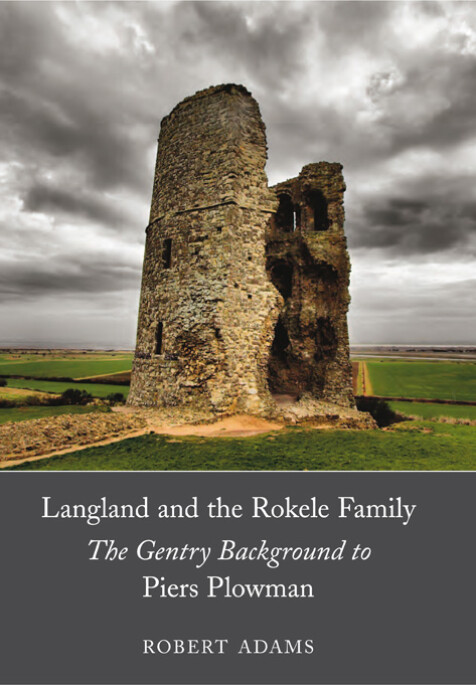Langland and the Rokele family
The gentry background to 'Piers Plowman'
Robert Adams
‘Any search for the historical identity of “William Langland”, many critics would say, is an exercise in futility, a projection of the critic’s own desires. Robert Adams has no truck with such defeatism … what we have [in this book] is one of the most important studies of the authorship and social milieu of Middle English poetry every produced’, Lawrence Warner, Modern Language Review (July 2015).
‘Adams has now excavated deeply and expertly the history of the Rokeles, especially uncovering their ties with more powerful figures even as the family declined in wealth and position, while retaining a sense of former dignity. Adams’ achievement is not only to lay out a terse history of the Rokeles, but also to track other families and notables with whom Rokeles maintained associations … In many ways this is the breakthrough study of the poet’s life that many have hoped for … As this book demonstrates, a new world of biographical Langland-Rokele criticism is a liberating opportunity for reassessing not only the local, but also the major issues of late medieval culture, in the conflicting and irresolute ways to which those who love Piers Plowman are so drawn', Andrew Galloway, Renaissance Quarterly (Spring 2014).
‘Robert Adams has undertaken to explore in extraordinary detail the history of the Rokayles throughout the Middle Ages … The importance of this history is that it makes clear, for those who still cling to a romantic notion of the poet as an impoverished outcast lolling in London, that Langland had powerful backing, not just from the Rokeles themselves but from influential patrons who supported and protected them', Thorlac Turville-Petre, Medium Ævum (2014).
‘I have read [the book] and enjoyed it immensely. I admired the extraordinary command of local and family history … and I was spell-bound by the speculations concerning William of Rokele … The great thing about the book is that it gives a completely new and very rich context for thinking about Langland, some part of it necessarily true, all of it tantalisingly possible’, Derek Pearsall, Professor emeritus, York & Harvard (June 2013).
‘A welcome addition to the “Dublin Studies in Medieval and Renaissance Literature” series and a volume which deftly fulfils the aim of the series to provide “revaluations of major aspects of the literature of the period as well as original studies which break new ground or offer fresh approaches to familiar subjects”. In this study – a book whose relative slightness belies the scope of its historical research – Adams presents a fascinating history of Langland’s assumed paternal family [and] suggests and intriguing new context for readings of Piers Plowman … a provocative and entertaining introduction … the first chapter offers a concise and thorough appraisal of the extant evidence for associating the author of Piers Plowman with the Rokele family … Adams’ speculations are plausible, provocative and thought-provoking … reflecting the highly detailed knowledge of both the poem and its critics that one would expect from a Langlandian scholar of Adams’ renown … Whether or not one accepts in their entirety Adams’ lines of argument in this study, his latest book provides a rich and provocative context for thinking about the author of Piers Plowman, and as such this volume will be of great interest both to Langlandian scholars and to scholars of Middle English literature more generally', Kath Stevenson, Óenach: FMRSI Reviews (2013).

